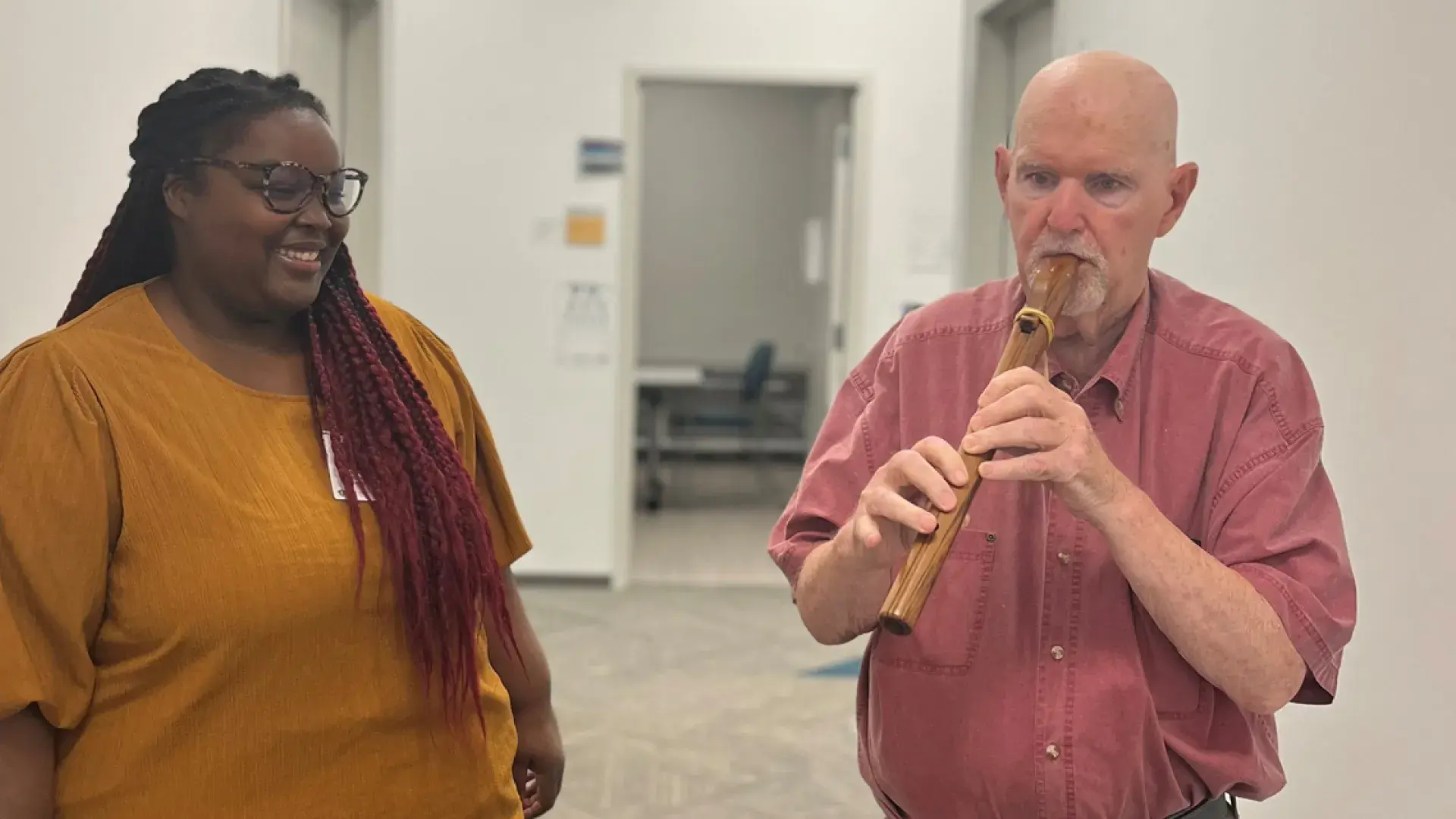
For 20 years, the Aphasia Center at the Dr. Charles and Ann Sanders IMPACT Practice Center has been one of the MGH Institute’s best kept secrets. But for the clients who depend on it, it’s been a lifeline to a better way of communicating, and it’s free of charge.
“The thing here is that I’ve had a wonderful experience,” said client Leo Rogers, an avid musician, composer, and photographer. “My time here is great, and I get to spend time working with students and playing my flutes.”
The Aphasia Center, part of the Julie Atwood Speech, Language, and Literacy Center, was started by Department of Communication Sciences and Disorders Chair Marjorie Nicholas 20 years ago.
“There was a definite need for this kind of service,” said Dr. Nicholas. “With all the expertise and knowledge about speech-language pathology at the Institute, it was a great way to assist clients while providing our students with valuable hands-on experiences.”
Since the opening of the Aphasia Center, over 250 clients have been seen by nearly 400 speech-language pathology students.
“This opportunity piqued my interest because there is a different kind of clinician-client connection built in one-on-one settings like this one,” said SLP student Simone Moss. “Getting a window into a client’s life while supporting their individual goals is eye-opening and inspiring.”
Each year, the Center works with between 50 and 60 clients who receive individualized treatment plans based on their own communication goals and the results of their diagnostic evaluation. Graduate students in the final year of the Master of Speech-Language Pathology program, along with faculty, develop these plans and provide these services. Treatments are given once or twice a week to clients, many of whom have exhausted their insurance benefits and been told they’ve “plateaued” by insurance companies that contend they cannot progress further.
Only 40% of people have heard the term aphasia and can identify what it means. And yet, on any given day in the United States, a person is diagnosed with the condition every four minutes. More than two million people in this country have aphasia. While stroke is the most common cause of the condition, other leading causes include traumatic brain injuries, brain tumors, and progressive neurological conditions that damage the brain over time, such as dementia.
Broadly, aphasia can impact speech, writing, and understanding of both the spoken and written word. Within the brain itself, aphasia results from damage in a specific area of the brain. There are two types of the condition – fluent and non-fluent. In fluent aphasia – one type is known as Wernicke’s Aphasia – the damage is to the temporal lobe and causes those who have it to have difficulty understanding spoken language and speak in long sentences with little meaning, often including unnecessary words and made-up words. In non-fluent aphasia – one type is known as Broca’s Aphasia – the damage is to the frontal lobe, causing individuals to speak in short phrases that require great effort. There are other subtypes of aphasia as well, all of which result from damage to different language areas in the brain and all of which make successful communication challenging.
Research on the outcomes of aphasia treatment, impacts of interprofessional programs such as this one, the relationship between executive functioning and aphasia, and quality of life for these individuals spurred Nicholas to start the Aphasia Center in 2002.
“The graduate students and the faculty call you clients, but really you are the true teachers of our students,” Nicholas said at a July 28 event to commemorate the center’s two decades of operation. “It's by working with clients like you and learning about your aphasia and how it has affected your lives that our grad students truly understand what aphasia is and what it means to live your life with aphasia. You may not remember all the students who work with you, but I can guarantee that the students will all remember each one of you.”
Moss will certainly remember the clients she has worked with because for her, it’s personal.
“The work I’ve done here reminds me of my grandparents, one of which struggled with dementia,” said Moss, who will finish the program in September, “I was able to see firsthand how support from a speech pathologist would have helped and I want to be able to be that for someone else.”
That someone else was Rogers, who, thanks to the one-on-one attention he received at the Aphasia Center, has returned to playing the flute, one of his passions. “It’s crazy what I’ve been able to accomplish here,” said a beaming Rogers.
